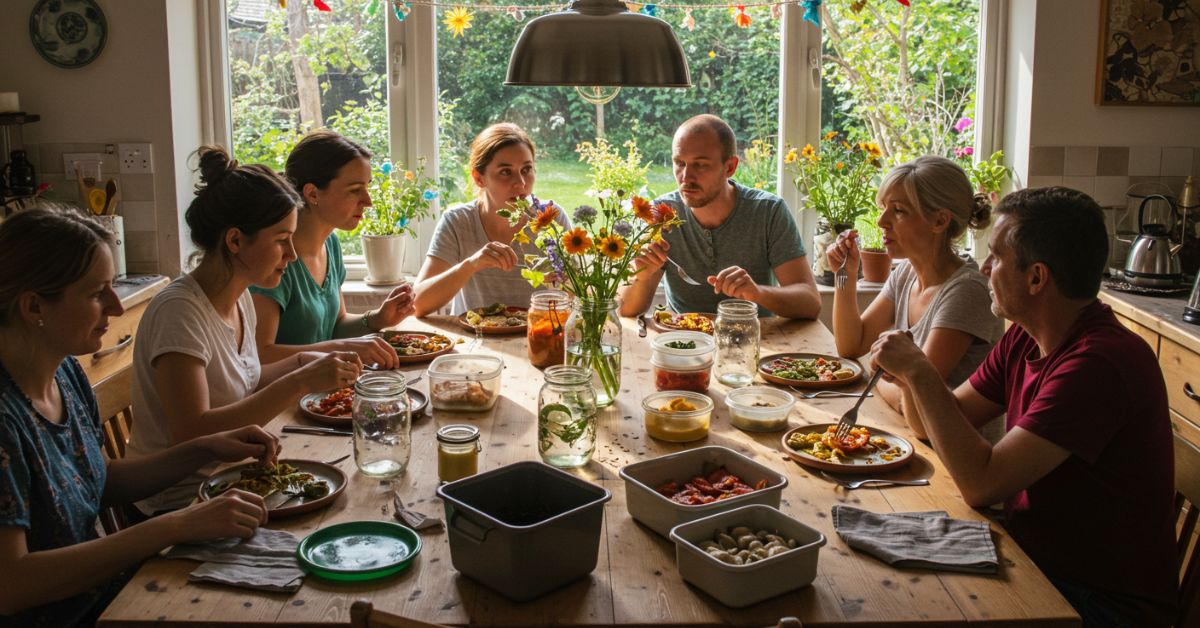Hosting friends and family at home is always special, but it often comes with a lot of waste. From disposable plates to leftover food that ends up in the bin, a gathering can unintentionally create a significant environmental footprint. If you want to entertain without harming the planet, learning how to host a zero-waste home gathering can make all the difference. It is not only possible to enjoy a wonderful evening with guests while keeping waste to a minimum, but it can also inspire others to adopt more eco-friendly habits in their own homes.
In this guide, we will walk through practical steps for planning, preparing, and hosting an event that is as kind to the planet as it is enjoyable for your guests.
1. Planning Ahead for a Sustainable Event
The key to hosting any gathering successfully is preparation, and this is even more important when aiming for zero waste. Start by making a clear plan of the menu, seating arrangements, and activities. Keep guest numbers realistic so you can cater accurately and avoid over-purchasing.
Send digital invitations instead of printed ones. This not only saves paper but also makes it easier to track responses and share updates. If some of your guests are less tech-savvy, a simple phone call can be just as personal and waste-free.
When you plan early, you have more time to borrow rather than buy. If you need extra chairs, crockery, or cutlery, ask friends or neighbours before resorting to purchasing something new.
2. Choosing Eco-Friendly Tableware
Disposable cups, plates, and cutlery are among the biggest sources of waste at gatherings. Instead, use what you already have at home. If you do not have enough, borrow from friends or hire from a local catering company that offers reusable tableware.
If you must use disposable items, choose compostable options made from materials like bamboo, palm leaf, or sugarcane fibre. They can be composted after use, reducing landfill waste significantly.
For napkins, opt for fabric ones that can be washed and reused. They add a touch of elegance to your table and save resources in the long run.
3. Food and Drink Without the Waste
One of the most important aspects of how to host a zero-waste home gathering is being mindful of food. Over-catering often leads to leftovers that may not be eaten. To avoid this, confirm numbers early and prepare portion sizes accordingly.
Choose recipes that use seasonal and locally sourced ingredients. Not only is this better for the environment, but it also supports local farmers and reduces transportation emissions.
For drinks, skip single-use plastic bottles and cans. Serve filtered tap water in glass jugs, and consider making large batches of homemade lemonade, iced tea, or cocktails in reusable containers. Encourage guests to refill their glasses rather than using multiple ones throughout the evening.
If there are leftovers, have reusable containers ready for guests to take some home. You can also freeze portions for future meals, making sure nothing goes to waste.
4. Zero-Waste Cleaning Solutions
After a party, the cleaning process often generates more waste than the event itself. Use washable cloths instead of disposable wipes and opt for eco-friendly cleaning products in refillable bottles.
For the bathroom, consider stocking it with eco-friendly essentials. A bamboo toilet roll is a sustainable alternative to conventional paper, made from a fast-growing and renewable resource. It is softer, stronger, and better for the environment.
Keep a clearly labelled recycling bin in the kitchen so guests can dispose of bottles, cans, and paper responsibly. If your local council offers food waste collection, make sure scraps are placed in the correct bin.
5. Decoration That Does Not End Up in the Bin
Party decorations often involve plastic balloons, glitter, and banners that are used once and thrown away. Instead, get creative with reusable or natural decorations.
Fresh flowers in vases can brighten up any room, and potted plants make excellent centrepieces that can be enjoyed long after the event. You can also use fabric bunting, fairy lights, or candles for a cosy and festive atmosphere.
If you want a theme, consider incorporating nature-inspired elements. Wooden boards, recycled glass jars, and ceramic dishes can be styled beautifully without adding to landfill.
6. Creating a Memorable Atmosphere
A zero-waste gathering is not just about what you avoid, but also about the experience you create. Organise activities that require little or no resources, such as board games you already own, live music from a friend, or a group cooking session.
Consider encouraging guests to bring something homemade, whether it is food, a drink, or even a playlist. This reduces your workload and adds a personal touch while avoiding mass-produced, packaged items.
7. Bathroom and Kitchen Considerations
When guests visit, the bathroom and kitchen will naturally see more use. For the bathroom, provide sustainable hand soap in a refillable dispenser instead of single-use bottles. A bamboo loo roll box is another eco-friendly touch that aligns with your zero-waste theme.
In the kitchen, keep things sustainable by using reusable dish cloths and natural cleaning brushes. Instead of reaching for paper towels, consider having a bamboo kitchen roll on hand. These are washable, compostable, and much kinder to the planet.
8. Communicating Your Zero-Waste Approach
Part of how to host a zero-waste home gathering is sharing your intentions with your guests in a friendly way. This does not mean lecturing anyone, but a short message in your invitation explaining your eco-friendly focus can set the tone.
Let people know you are avoiding disposables, supporting local produce, and aiming to compost food scraps. Most guests will be happy to contribute to your efforts, and some may even take inspiration for their own gatherings.
9. Managing Waste During the Event
Even with the best planning, some waste is inevitable. The goal is to reduce it as much as possible and handle it responsibly.
Have clearly labelled bins for recycling, composting, and general waste. Place them where they are easy to find so guests are more likely to use them correctly. If you compost at home, make sure you have a covered bin in the kitchen to collect food scraps without creating unpleasant smells.
10. Following Up After the Gathering
Once the event is over, take a moment to review how it went. Did you manage to stick to your zero-waste goals? Were there any unexpected sources of waste? This reflection will help you improve next time.
You could also send a thank-you message to your guests, letting them know how much you appreciated their efforts in keeping the gathering eco-friendly. A few photos from the night can make it more personal and memorable.
11. The Bigger Impact of Small Changes
Hosting one zero-waste gathering might seem like a small act, but its influence can spread far beyond your own home. Friends and family may see how easy and enjoyable it can be to entertain sustainably and start making changes in their own lives.
By showing others how to host a zero-waste home gathering, you help normalise eco-conscious habits. Over time, these individual efforts can lead to significant environmental benefits.
Final Thoughts
Entertaining without waste is not about perfection. It is about making thoughtful choices that reduce harm to the environment while still creating a warm, welcoming, and enjoyable experience for your guests. Whether it is choosing reusable tableware, avoiding over-catering, or adding sustainable touches like bamboo products, each step counts.
The next time you plan a get-together, remember that knowing how to host a zero-waste home gathering can turn a simple evening into something truly meaningful. It is a chance to show that sustainability can be stylish, practical, and, above all, achievable.


